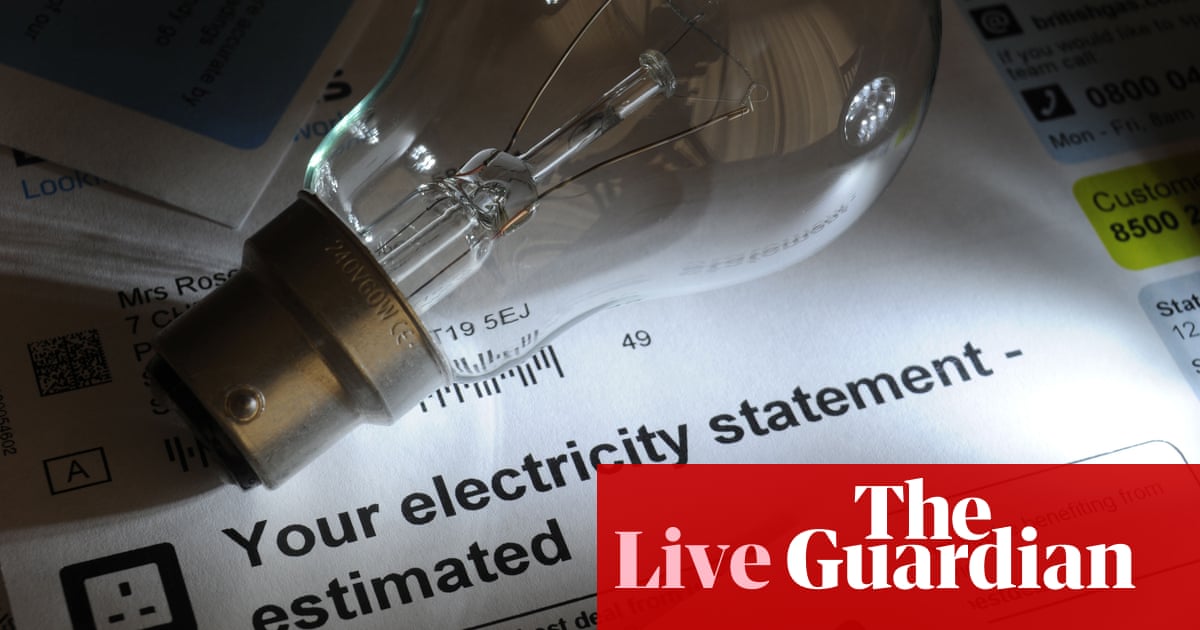Introduction: Energy price cap tipped to rise 1% in January
Good morning, and welcome to our rolling coverage of business, the financial markets and the world economy.
Household energy bills across Great Britain are set to rise at the start of next year, analysts predict, putting more pressure on household finances.
Officially, the price cap for January-March 2025 will be set on Friday morning by regulator Ofgem, limiting what energy providers can charge in England, Scotland and Wales.
But analysts at Cornwall Insight have crunched the numbers, and predict that the cap for a typical dual fuel household will rise to £1,736 per annum in January, up from the current level of £1,717 per year set in October.
This is a rise of 1% from the current price cap – a blow to hopes that bills might drop at the start of 2025.
Importantly, though, the cap limits the amount that a consumer can be charged for each unit of energy – not a ceiling on potential bills, which are usually higher in the winter as households spend more to keep warm.
Cornwall Insight, whose calculations are based on the wholesale price of energy, say:
The cap level is a reflection of a relatively volatile wholesale market, influenced by supply concerns tied to geopolitical tensions, maintenance on Norwegian gas infrastructure, weather disruptions, amongst other smaller factors.
Despite prices stabilising in comparison to the past two years, the market remains very sensitive to global events. This is leaving prices substantially above historic averages.
At the end of September, Cornwall had expected the price cap would dip in January, but wholesale energy prices have been higher than hoped.
Last Friday, the month-ahead price of UK gas rose to a one-year high of almost 120p per therm.
Gas prices rose last week, after Austrian group OMV warned of a potential disruption to supplies from Russia. On Saturday, Gazprom did indeed stop supplies to Austria, after OMV won a €230m arbitration award against Russia’s state-owned natural gas company.
Looking further ahead, Cornwall currently forecast the cap will drop slightly in April 2025 and again in October 2025.
The agenda
-
8am GMT: Bundesbank President Joachim Nagel gives speech
-
10am GMT: Eurozone trade balance for September
-
3pm GMT: US Nahb Housing Market Index
Key events
Here’s the details of Cornwall Insight’s forecasts for Britain’s energy price cap from January.
Cornwall: ‘disappointing’ that prices won’t drop in January
This morning’s prediction of a small rise in energy bills in January will be “disappointing”, says Dr Craig Lowrey, Principal Consultant at Cornwall Insight, especially as the weather gets chillier.
“Our final price cap forecast for January indicates, as expected, bills will remain largely unchanged from October. Supply concerns have kept the market as volatile as earlier in the year, and additional charges have remained relatively stable, so prices have stayed flat. While we may have seen this coming, the news that prices will not drop from the rises in the Autumn will still be disappointing to many as we move into the colder months.
“Fuel poverty has occupied political agendas for years, with little long-term progress. This winter, millions of households say they will not heat their homes to recommended temperatures, risking serious health consequences. With it being widely accepted that high prices are here to stay, we need to see action. Options like social tariffs, adjustments to price caps, benefit restructuring, or other targeted support for vulnerable households must be seriously considered.
“Long-term, our transition away from the volatile global wholesale market toward sustainable, home-produced renewables can help to secure our energy future. Although the transition does require upfront investment, it promises lower bills down the line. The government needs to keep momentum on the transition while acknowledging that immediate support is essential for those struggling now. Inaction is a choice to leave people in the cold.”
Introduction: Energy price cap tipped to rise 1% in January
Good morning, and welcome to our rolling coverage of business, the financial markets and the world economy.
Household energy bills across Great Britain are set to rise at the start of next year, analysts predict, putting more pressure on household finances.
Officially, the price cap for January-March 2025 will be set on Friday morning by regulator Ofgem, limiting what energy providers can charge in England, Scotland and Wales.
But analysts at Cornwall Insight have crunched the numbers, and predict that the cap for a typical dual fuel household will rise to £1,736 per annum in January, up from the current level of £1,717 per year set in October.
This is a rise of 1% from the current price cap – a blow to hopes that bills might drop at the start of 2025.
Importantly, though, the cap limits the amount that a consumer can be charged for each unit of energy – not a ceiling on potential bills, which are usually higher in the winter as households spend more to keep warm.
Cornwall Insight, whose calculations are based on the wholesale price of energy, say:
The cap level is a reflection of a relatively volatile wholesale market, influenced by supply concerns tied to geopolitical tensions, maintenance on Norwegian gas infrastructure, weather disruptions, amongst other smaller factors.
Despite prices stabilising in comparison to the past two years, the market remains very sensitive to global events. This is leaving prices substantially above historic averages.
At the end of September, Cornwall had expected the price cap would dip in January, but wholesale energy prices have been higher than hoped.
Last Friday, the month-ahead price of UK gas rose to a one-year high of almost 120p per therm.
Gas prices rose last week, after Austrian group OMV warned of a potential disruption to supplies from Russia. On Saturday, Gazprom did indeed stop supplies to Austria, after OMV won a €230m arbitration award against Russia’s state-owned natural gas company.
Looking further ahead, Cornwall currently forecast the cap will drop slightly in April 2025 and again in October 2025.
The agenda
-
8am GMT: Bundesbank President Joachim Nagel gives speech
-
10am GMT: Eurozone trade balance for September
-
3pm GMT: US Nahb Housing Market Index












